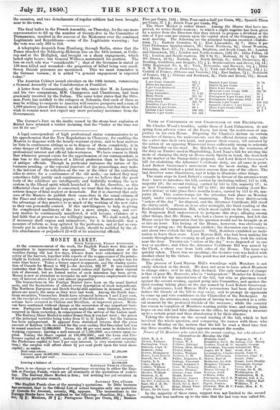VOTES OF CONFIDENCE IN THE CHANCELLOR OF THE EXCHEQUER.
Sir Charles Wood's troubles, unlike those of Lord Palmerston, do not spring from adverse votes of the Peers, but from the restiveness of ma- jorities in his own House. Disputing Sir Charles's dictum on certain branches of finance, the malecontents cast the official dictator aside, take the matter into their own hand, and pursue their course, till arrested by the action of an opposing Ministerial force sufficiently strong to reinstate the Chancellor on his stool. Mr. Mitchell's motion for the remission of the duty on Timber used in Shipbuilding, Lord Naas's bill for altering the mode of charging the duty on Home-made Spirits in bond, the dead-lock in the matter of the Stamp-duties proposal, and Lord Robert Grosvenor's bill for abolishing the Attornies. Certificate duty, are all eases in point. Lord Robert Grosvenor's movement was the most daring, the most harassing, and reached a point nearer success than any of the others. The last deserves some illustration, and it helps to illustrate other things.
1 The main steps in Lord Robert's crusade in favour of the attornies were four : leave to introduce the bill, carried by (including tellers) 157 to 138, majority 19; the second reading, carried by 141 to 124, majority 17; to go into Committee, carried by 107 to 105; the third reading (Lord Ro- bert's defeat) to take place three months hence, carried by 115 to 86, ma- jority 29. This contre-temps for the attornies took place on Monday night, under circumstances not unamusing. There were thirty-seven • "orders of the day" for disposal, and the Attornies' Certificate Bill stood the thirty-sixth. About an hour alter midnight, the third reading of the Ecclesiastical Commission Bill, which stood eighth on the list, came on. Sir Benjamin Hall endeavoured to postpone this atop; alleging among other things, that Mr. Hume, who had a clause to postpone, had left the House under the impression that the question would not be brought on at so late an hour. The feeling of the House, however, was obviously in favour of going on ; Sir Benjamin yielded ; the discussion ran its course ; and clout two o'clock the but passed. Still, Members exhibited no incli- nation to leave their scats. Lord Marcus Hill, who had been making his rounds throughout the evening in all parts of the House, took his station near the door. Twenty-six "orders of the day" were disposed of in one way or another ; and when the Attoruies' Certificate Bill was named by the Clerk, a cheer rose from both sides of the House. The issue was quickly taken. There was no speaking ; the decisive vote was hailed with another cheer by the victors. This point was not reached till a quarter to three o'clock.
The process of Lord Marcus Hill's wrestlinges with Members is not easily detected in the detail. He does not seem to have asked Members to change sides ; or if he did, they declined. The only instance of change is that of peer Mr. Bouverie, who as "independent" Member for Kilmar- nock voted for the introduction of the bill, but who as placeman voted against the second reading, against going into Committee, and against the third reading-taking- place on the day named by Lord Robert Grosvenor. To all appearance, Lord Marcus Hill's persuasions had been directed to induce the friends of the bill to stay away, and to prompt its opponents to come up and vote confidence in the Chancellor of the Exchequer. At all events, the attornies may complain of having been deserted at a criti- cal moment by the professed friends of the measure ; while the country has reason to complain of Members wasting public time, and raising false hopes on one side and false alarms on the other, by supporting a measure up to a certain point and then abandoning it by their absence.
Taking the division on the second reading of the bill, which in fact involved the whole question, and comparing the names with those who voted on Monday on the motion that the bill be read a third time that day three months, the following appears amongst the results.
Names of 75 Memberswho voted for the second reading, but who absented themselves on Monday the 24. Adair, It. A. S. Evans, John Itotham, Lord Bepton, G. W. J. Alcock, Thomas Evelyn, W. J. Knighticy, Sir C. Bt.Salway, Col. Henry
Barrington, Visct. Fellows, Edward Lennox, Lord H. C. Sanders, GeoTe • Bateson, Capt. T. Fitzroy, Hon. Henry Lewisham, Viscount Scholeticki, Benbow, John Floyer, John Lopes, Sir H. Bart. Scott, Hon. F.
Brown, Humphrey Forbes, witliam Lushington, Charles Smyth, John G.
• Bruce, Lord Ernest Frewen, C. H. Mahon, O'Gorman Somerset, Capt. E. Burrell, Sir C. M. Fuller, Augustus E. March, Earl of Stuart, John Cayley, E. S. Galway, Viscount Matheson, Lt.-CoL Stuart, Lord Dudley Coles, Henry B. Gooch, Edward S. Meagher, Thomas Thompson, George Collins, William Gore, W. Ormsby Mullings, J. It. Vescy, Hon. T. Compton, Henry C. Greene, Thomas Manta, George F. Vyvyan, Sir It. Bt. Deedes, William Greene, Capt. John Norreys, Lord Waddington, D.
Denison, E. B. Heald, James O'Brien, John wadcbsgton, H. 8., Disraeli, Benjamin Heywood, James Pakington, Sir J. S. Watkins, CoL .L L. Du Pr5, Caledon G. Ilildyard, Bob. C. Pearson, Charles Welby, Glrne Earl East, Mr J. B. Bt. Hood, Sir A art Pigott. Francis P.
ke, —on. T.
Egerton, W. T. Hope,Henry
Evans, Sir De Lacy Hornby, John Pugh, David
1 In the majority of these cases, support was not limited to the second reading, but was uniform up to the time that the last vote was called for.


























 Previous page
Previous page